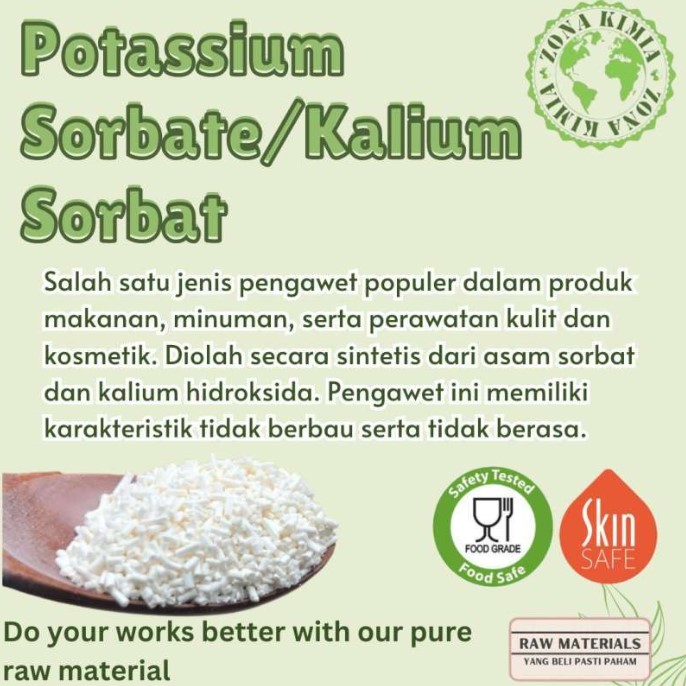BOURSESSENEGAL – In the world of food preservation, potassium sorbate stands out as a widely used additive. This compound acts as a preservative, helping to extend the shelf life of various products. If you’ve ever wondered about the role potassium plays in your food, you’re not alone. Let’s dive deeper into its uses, benefits, and safety concerns.
What is Potassium Sorbate?
Potassium sorbate is a salt derived from sorbic acid, a natural compound found in some fruits. It is commonly used in food and beverage industries due to its effectiveness in inhibiting the growth of mold, yeast, and bacteria. This means it helps keep your favorite foods fresher for longer.
How is Potassium Sorbate Made?
The production of potassium sorbate involves neutralizing sorbic acid with potassium hydroxide or potassium carbonate. The result is a white, odorless powder that dissolves easily in water, making it ideal for various applications.
Common Uses of Potassium Sorbate
Food Preservation
One of the primary uses of potassium sorbate is as a food preservative. It is commonly found in:
- Baked Goods: Helps prevent mold and spoilage.
- Cheeses: Extends shelf life and maintains quality.
- Beverages: Especially in wines and fruit juices, it inhibits yeast and bacteria growth.
- Condiments: Used in sauces and dressings to prolong freshness.
Personal Care Products
Beyond food, potassium sorbate finds its way into personal care products such as lotions, shampoos, and cosmetics. In these applications, it serves as a preservative, ensuring that products remain free from microbial contamination.
Industrial Applications
In addition to food and cosmetics, potassium sorbate is used in some industrial applications, including:
- Plastic and Rubber: Acts as a stabilizer.
- Textiles: Helps in dyeing processes.
Benefits of Using Potassium Sorbate
Effective Preservation
Potassium sorbate is highly effective in controlling microbial growth. This property makes it invaluable in food production, ensuring that products remain safe for consumption over time.
Versatility
Another advantage of potassium is its versatility. It can be used in various industries, from food to cosmetics, making it a popular choice among manufacturers.
Minimal Impact on Flavor
Unlike some preservatives, potassium does not significantly alter the flavor of the products it preserves. This means you can enjoy the taste of your food without any noticeable chemical aftertaste.
Safety and Regulatory Status
Is Potassium Sorbate Safe?
The use of potassium is considered safe by major food safety authorities, including the U.S. Food and Drug Administration (FDA) and the European Food Safety Authority (EFSA). Studies indicate that it does not pose significant health risks when consumed in moderation.
Acceptable Daily Intake (ADI)
The acceptable daily intake for potassium varies by regulatory agency but is generally set at a level that ensures safety for consumers. For example, the FDA has established a limit that is well above typical dietary exposure.
Allergies and Sensitivities
While most people can safely consume potassium , a small percentage may experience allergic reactions or sensitivities. Symptoms can include skin irritation or respiratory issues. If you have known sensitivities, it’s advisable to check product labels carefully.
How to Identify Potassium Sorbate in Products
When shopping, you might want to look for potassium on ingredient lists. It is often labeled simply as “potassium .” Being aware of this can help you make informed choices about the products you consume.
Reading Labels
- Food Products: Check for potassium in baked goods, beverages, and sauces.
- Cosmetics: Look for it in lotions and creams to understand what you apply to your skin.
Alternatives to Potassium Sorbate
If you’re looking to avoid potassium for any reason, several natural alternatives can serve similar purposes:
Natural Preservatives
- Vinegar: Commonly used in pickling, it has antibacterial properties.
- Salt: A traditional preservative that inhibits microbial growth.
- Sugar: High concentrations can prevent spoilage in jams and jellies.
Essential Oils
Certain essential oils, such as rosemary and oregano oil, also exhibit preservative qualities. They can be a great alternative for those seeking more natural options.
Conclusion: The Role of Potassium Sorbate in Modern Food Production
In summary, potassium is an essential preservative in the food and cosmetics industries. Its effectiveness in preventing spoilage, versatility, and safety profile make it a popular choice for manufacturers. While most people can consume it without any issues, always read labels if you have sensitivities.
Next time you enjoy a fresh loaf of bread or a bottle of juice, remember the role potassium plays in keeping your food safe and delicious. Understanding additives like potassium empowers you to make informed choices about your diet and products, promoting a healthier lifestyle.
Frequently Asked Questions (FAQs)
What is the main purpose of potassium sorbate?
The primary purpose of potassium is to act as a preservative, inhibiting the growth of molds, yeasts, and bacteria in food and personal care products.
Is potassium sorbate vegan?
Yes, potassium is considered vegan as it is synthesized from natural sources and does not contain animal-derived ingredients.
Can I use potassium sorbate in home canning?
While potassium can be used in some home canning recipes, it is essential to follow specific guidelines and ensure proper food safety practices.
How should potassium sorbate be stored?
Potassium should be stored in a cool, dry place, away from direct sunlight to maintain its effectiveness.
By being informed about potassium , you can navigate the world of food preservatives confidently. Understanding its benefits and safety can help you make choices that align with your health goals.
REFERENCE : https://www.cdcfoundation.org/



